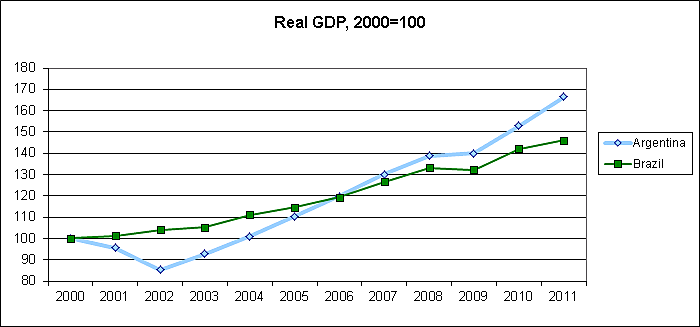Paul Krugman once again praises Argentina as a “remarkable success story” in a recent blog post. He blames biased economics reporting for the bad news recently associated with the country (though he is careful not to mention nationalizations, massive capital flight, cooking of official statistics, bans on the importation of books, attacks on freedom of the press, etc.). He points to this graph to prove the “basic fact” that Argentina’s growth outperforms that of neighboring Brazil, and thus it should be taken more seriously:
Krugman’s dismissal of economics reporting about Argentina may explain why he doesn’t mention the fact that the administration of Cristina Fernández de Kirchner cooks the inflation numbers. The story was recently highlighted in The Economist, which even removed the official inflation figure from its indicators page. As the magazine put it, “Since 2007 Argentina’s government has published inflation figures that almost nobody believes.” Apparently, nobody but Paul Krugman.
Since Argentina’s Consumer Price Index significantly understates true inflation (the official figure for 2011 was 9.7% whereas private estimates put the figure at 24.4%), the country’s real GDP is overestimated. By how much is difficult to asses. However, in a report [requires free subscription] for the Argentine consultancy firm Elypsis, economists Eduardo Yeyati and Luciano Cohan, constructed an “Elypsis Coincident Activity Index” (ECAI) using 9 series of economic data from the Monthly Index of Economic Activity (MIEA)—a proxy for the GDP. As expected, they found a high correlation between the ECAI and the MIEA until 2007, when the government fired the head of the statistics office and politicized it. After that year, both indicators increasingly deviate.
Based on Elypsis’ index, I’ve recalculated the GDP performance of Argentina and compared it to Brazil’s:
* GDP performance since 2007 estimated on the ECAI.
As we can see, Argentina’s GDP doesn’t outperform Brazil’s in the last decade. Moreover, I should note three things: First, by using 2000 as the year base, Krugman neglects to show that Argentina was already 2 years into a recession, thus giving an impression of a especially strong performance in the last decade. Second, nobody denies that even when corrected, Argentina has experienced strong growth in the last 7–8 years. However, that has to do with high commodity prices, especially of soybeans, and an expansive fiscal policy that can’t be sustained for much longer (thus the high inflation). Third, by comparing it to Brazil, Krugman picked a low standard of economic performance in Latin America. As I pointed out in an op-ed a year and a half ago, Brazil’s economic growth is far from stellar: “In the last decade, 10 Latin American countries enjoyed higher growth rates than Brazil.”
Paul Krugman’s love affair with the Kirchner economic model in Argentina should be taken for what it is and certainly not as a guide for economic recovery in the U.S. and Europe.


